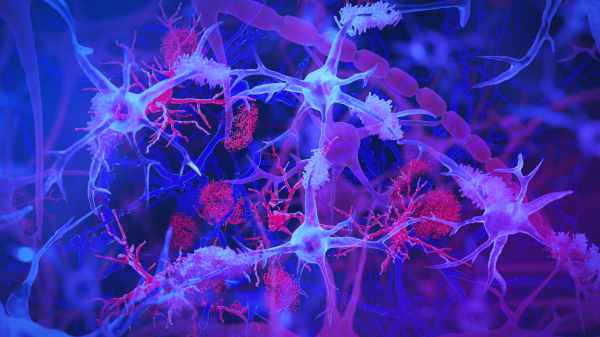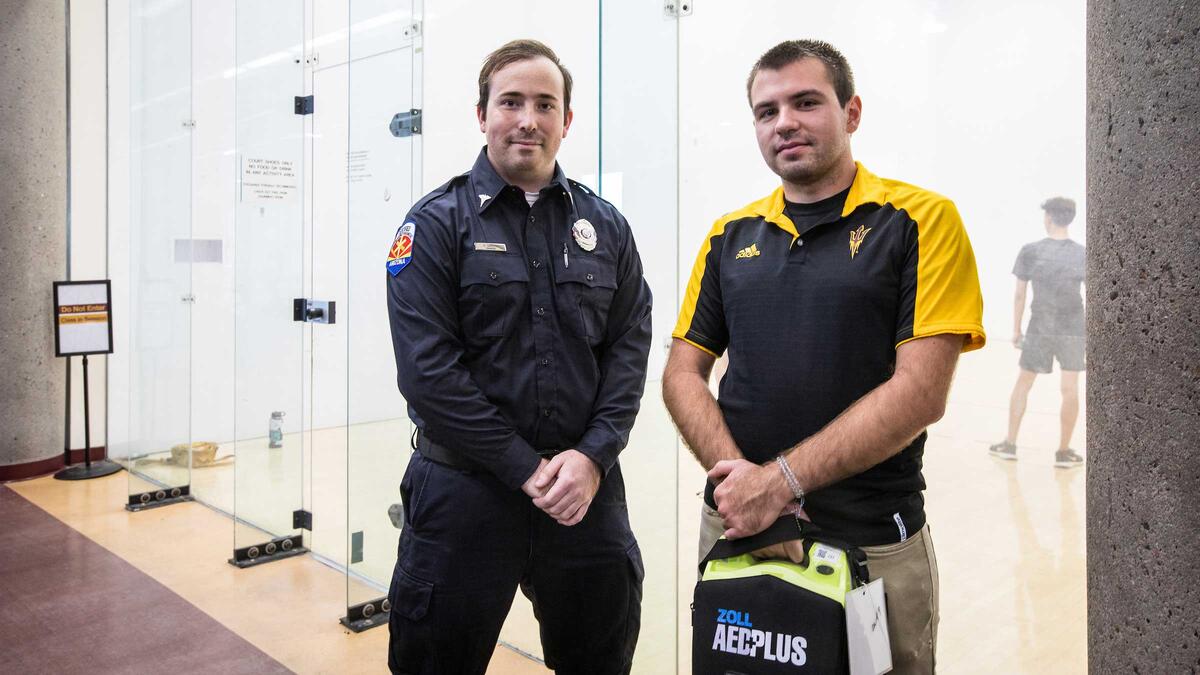Two minutes is all it took for a couple of Sun Devils to help save a life during a recent four-day racquetball tournament on the Tempe campus.
A participant in the Arizona Open Pro-Am suffered from cardiac arrest and collapsed mid-game Oct. 25 at the Sun Devil Fitness Complex.
“He didn’t have a pulse, and he wasn’t really breathing on his own,” said Daniel Sardina, an ASU alumnus and off-duty paramedic who had been taking part in the tournament.
Sardina started CPR immediately. Not far behind was Michael Alex, a student worker at the fitness complex, who was in his boss’s office when the call for help came out. Although this was his first time responding to a cardiac arrest since being certified, Alex (pictured above right, with Sardina) quickly applied the automated external defibrillator.
“I just acted on instinct and acted on training and just did was I was trained to do,” said Alex, a mechanical engineering senior.
One minute into CPR, they administered a single shock and continued CPR. In a matter of two minutes, the man's heart was beating again.
According to the American Heart Association, chances of survival after suffering cardiac arrest can double, even triple, within minutes of starting CPR. Add in an AED, and the outcome is even more promising. Sardina said the man is doing well.
Sardina encourages others to apply both life saving techniques — if possible — before first responders arrive. “It gives us more of a success rate if we have good CPR going on before we get there.”
Fortunately, in this case, both men used the medical training they received at ASU. Alex is CPR and AED certified and is the lead aquatic and safety education instructor at the fitness complex. He was presented a Sun AwardSun Awards are employee recognition awards at ASU. for his heroic actions.
Alex said his initial thought had been, “We saved him! And I’m just happy he was OK more than anything.”
As for Sardina, this isn’t his first time saving a life on campus. He administered CPR on the same court during a different racquetball tournament a few years ago. He works as a paramedic for American Medical Response in Mesa, but during his time at ASU (he graduated with a degree in business law), he was part of the Emergency Medical Services program.
EMS provides standby emergency medical service to the university, especially during special events. There are currently 22 certified students who work in the program either as EMTs or medical dispatchers.
“EMS also manages the University’s AED program. Our staff checks all of the AEDs once a month to make sure they are ready for immediate use,” said Michael Overmyer, EMS coordinator.
ASU has 402 AEDs in service across all locations, including at the Washington, D.C., facility. Six of those AEDs are inside the Tempe fitness complex.
Emergencies aren’t predictable. CPR and AED training only increase the odds of survival, no matter where you are or who needs help.
“When everything comes together the right way, we get good results,” Sardina said.
Both EMS and SDFC offer a variety of CPR and AED courses throughout the year for ASU students, staff and faculty. For the SDFC schedule, visit the Sun Devil Fitness website. For EMS courses, search ASU Events by typing the keyword CPR. The next EMS training will take place Friday, Nov. 8, at the Polytechnic campus.
Top photo: Daniel Sardina (left) and Michael Alex responded to a fallen athlete at the 2019 Arizona IRT Pro-Am Racquetball, on court 9 at the Sun Devil Fitness Center, on Oct. 25. Paramedic and racquetball player Sardina, an alumnus, noticed the player slumped against the glass and, after a quick assessment, applied CPR. Alex, a mechanical engineering senior, is a CPR and lifeguard instructor and administered the portable defibrillator. The victim survived. Photo by Charlie Leight/ASU Now
More Health and medicine

The surprising role of gut infection in Alzheimer’s disease
Arizona State University and Banner Alzheimer’s Institute researchers, along with their collaborators, have discovered a surprising link between a chronic gut infection caused by a common virus and…

ASU, University of Wisconsin partner to empower Black people to quit smoking
Arizona State University faculty at the College of Health Solutions are teaming up with the University of Wisconsin to determine which treatments work best to empower Black people to quit…

New book highlights physician wellness, burnout solutions
Health care professionals dedicate their lives to helping others, but the personal toll of their work often remains hidden.A new book, "Physician Wellness and Resilience: Narrative Prompts to Address…
